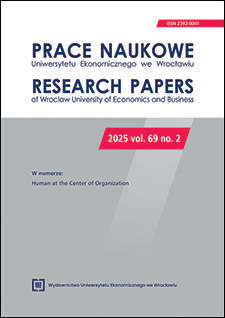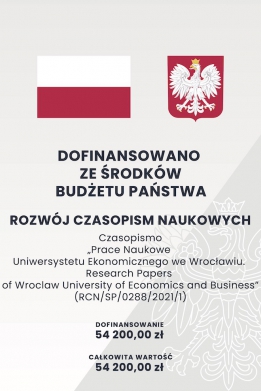Zaangażowanie pracowników pokolenia Z − diagnoza, oczekiwania, kierunki działań
DOI:
https://doi.org/10.15611/pn.2025.2.03Słowa kluczowe:
Pokolenie Z, zaangażowanie, oczekiwaniaAbstrakt
Cel: Celem artykułu jest określenie poziomu zaangażowania przedstawicieli pokolenia Z oraz wskazanie kierunków działań służących jego świadomemu kształtowaniu w organizacji.
Metodologia: Przeprowadzono przegląd literatury oraz analizę wyników badania ankietowego wśród studentów Uniwersytetu Ekonomicznego we Wrocławiu. Badanie oparto na typologii zaangażowania w organizację, pracę, zawód i w relacje z przełożonym.
Wyniki: Respondenci deklarowali wysoki poziom zaangażowania. Najwyższy odsetek respondentów zadeklarował zaangażowanie w pracę, na drugim miejscu znalazło się zaangażowanie w relacje z przełożonym; zaangażowanie w organizację uzyskało najniższy odsetek deklaracji. Kobiety częściej deklarowały zaangażowanie w pracę i w zawód; mężczyźni bardziej pozytywnie oceniali swoje zaangażowanie w relacje z przełożonym.
Wnioski i rekomendacje: Organizacje powinny wspierać zaangażowanie m.in. poprzez mentoring, partycypację pracowników w zarządzaniu oraz promowanie odpowiedzialności społecznej i śro-dowiskowej. Istotne jest tworzenie systemów motywacyjnych premiujących aktywność ekologiczną, co może wspierać integrację młodych pracowników z misją firmy.
Oryginalność/wartość: Zastosowany model zaangażowania pozwala na kompleksową ocenę preferencji przedstawicieli Pokolenia Z w kontekście przywiązania do organizacji, wykonywanej pracy, zawodu i przełożonego. Umożliwił także identyfikację kluczowych czynników motywacyjnych w tych obszarach, które wspierają zaangażowanie młodych pracowników, umożliwiając projektowanie skutecznych działań zarządczych.
Pobrania
Bibliografia
Adamska-Chudzińska, M., & Andraszak, N. (2023). Podejście sytuacyjne w zarządzaniu zaangażowaniem w organizację. PWE.
Aggarwal, A., Sadhna, P., Gupta, S., Mittal, A., & Rastogi, S. (2020). Gen Z Entering the Workforce: Restructuring HR Policies and Practices for Fostering the Task Performance and Organizational Commitment. Journal of Public Affairs, 22(3),
21-22. https://doi.org/10.1002/pa.2535
Bakker, A. B., & Bal, P. M. (2010). Weekly Work Engagement and Performance: A Study among Starting Teachers. Journal of Occupational and Organizational Psychology, 83(1), 189-206. https://doi.org/10.1348/096317909X402596
Barhate, B., & Dirani, K. M. (2022). Career Aspirations of Generation Z: A Systematic Literature Review. European Journal of Training and Development, 46(1-2), 139-157. https://doi.org/10.1108/EJTD-07-2020-0124
Boshoff, C., & Mels, G. (2000). The Impact of Multiple Commitments on Intention to Resign: An Empirical Assessment. British Journal of Management, 11(3), 255-273.
Dobrowolski, Z., Drozdowski, G., & Panait, M. (2022). Understanding the Impact of Generation Z on Risk Management – A Preliminary Views on Values, Competencies, and Ethics of the Generation Z in Public Administration. International Journal of Environmental Research and Public Health, 19(7). https://doi.org/10.3390/ijerph19073868
Dziopak-Strach, A. (2018). Management of Employees Commitment in the Context of Generational Changes in the Workplace. Studia i Prace WNEiZ, 51(2), 143-152. https://doi.org/10.18276/sip.2018.51/2-13
Fodor, M., & Jäckel, K. (2018). What Does It Take to Have a Successful Career through the Eyes of Generation Z – Based on the Results of a Primary Qualitative Research. International Journal of Lifelong Education and Leadership, 4(1), 1-7.
Gabrielova, K., & Buchko, A. A. (2021). Here Comes Generation Z: Millennials as Managers. Business Horizons, 64(4), 489-499. https://doi.org/10.1016/j.bushor.2021.02.013
Gajda, J. (2017). Oczekiwania przedstawicieli pokolenia Z wobec pracy zawodowej i pracodawcy. Prace Naukowe Uniwersytetu Ekonomicznego we Wrocławiu, 491, 158-171.
Gocłowska, B. (2019). Praca z młodym pokoleniem – „milenialsi” i pokolenie „Z”. https://doradcawpomocyspolecznej.pl/artykul/praca-z-mlodym-pokoleniem-milenialsi-i-pokolenie-z
Godlewska-Majkowska, H., & Lipiec, J. (2018). Zarządzanie różnorodnością pokoleniową zasobów pracy w przestrzeni regionalnej Polski. Prace Komisji Geografii Przemysłu Polskiego Towarzystwa Geograficznego, 32(3), 9-25. https://doi.org/10.24917/20801653.323.1
Hysa, B. (2016). Zarządzanie różnorodnością pokoleniową. Zeszyty Naukowe Politechniki Śląskiej, 97(1964), 389-398.
Instytut Nauk o Zarządzaniu i Jakości Wyższej Szkoły Humanitas (INZJWSH). (2023). Pokolenie Z na rynku pracy. Raport z badań. https://www.humanitas.edu.pl/resources/upload/zetki wyniki badań_RAPORT.pdf
Jagoda, A. (2016). Zarządzanie różnorodnością pokoleniową a organizacja czasu i miejsca pracy pracowników. Marketing i Rynek, 3, 209-218.
Juchnowicz, M. (2010a). Zarządzanie kapitałem ludzkim a poziom zaangażowania pracowników. Zarządzanie Zasobami Ludzkimi, 3-4, 57-66.
Juchnowicz, M. (2010b). Zarządzanie przez zaangażowanie. Koncepcja, kontrowersje, aplikacje. PWE.
Juchnowicz, M. (2014). Satysfakcja zawodowa pracowników. Kreator kapitału ludzkiego. PWE.
Kahn, W. A. (1990). Psychological Conditions of Personal Engagement and Disengagement at Work. Academy of Management Journal, 33(4), 692-724. https://www.jstor.org/stable/256287
Kincentric Polska. (2022). Pracodawcom udaje się zaangażować w pracę tylko połowę Zetek. https://dreamemployer.pl/niepokojace-wyniki-badania-kincentric-polska/
Klaffke, M. (2014). Millennials und Generation Z – Charakteristika der nachrückenden Arbeitnehmer-Generationen. In M. Klaffke, Generationen-Management (pp. 57-82). Springer Fachmedien. https://doi.org/10.1007/978-3-658-02325-6_3
Kordbacheh, N., Shultz, K. S., & Olson, D. A. (2014). Engaging Mid and Late Career Employees: The Relationship between Age and Employee Engagement, Intrinsic Motivation, and Meaningfulness. Journal of Organizational Psychology, 14(1), 11-25.
Lapoint, P. A., & Liprie-Spence, A. (2017). Employee Engagement: Generational Differences in the Workforce. Journal of Organizational Psychology, 17(5), 118-128.
Lipiński, F., & Koczy, J. (2023). Zjawisko Quiet Quitting wśród polskich pracowników z pokolenia Z. Academic Review of Business and Economics, 4, 54-72. https://doi.org/10.22367/arbe.2023.04.04
Lipka, A., & Król, M. (2017). Kapitał generacyjny versus kapitał multigeneracyjny. In A. Lipka & M. Król (Eds.). Gospodarowanie wielopokoleniowym Kapitałem ludzkim. Wybrane zagadnienia (pp. 47-60). CeDeWu.
Lewicka, D. (2017). Przywiązanie organizacyjne w zróżnicowanych pokoleniowo grupach pracowniczych. Zarządzanie Zasobami Ludzkimi, 3-4, 67-86.
Łaguna, M., Mielniczuk, E., Żaliński, A., & Wałachowska, K. (2015). Organizational Commitment and Work Engagement – Theoretical Conceptions and Terminological Problems. Medycyna Pracy, 2. https://doi.org/10.13075/mp.5893.00169
Ławińska, O., & Korombel, A. (2023). Pokolenie Z jako wyzwanie współczesnego zarządzania przedsiębiorstwem. Relacje, media społecznościowe i crowdsourcing. Wydawnictwo Politechniki Częstochowskiej. https://doi.org/10.17512/CUT/9788371939426
Mahmoud, A. B., Fuxman, L., Mohr, I., Reisel, W. D., & Grigoriou, N. (2021). “We Aren’t Your Reincarnation!” Workplace Motivation across X, Y and Z Generations. International Journal of Manpower, 42(1), 193-209. https://doi.org/10.1108/IJM-09-2019-0448
McGaha, K. K. (2018). An Interpretive Phenomenological Study of America’s Emerging Workforce: Exploring Generation Z’s Leadership Preferences. University of Phoenix.
Meyer, J. P., & Allen, N. J. (1991). A Three-Component Conceptualization of Organizational Commitment. Human Resource Management Review, 1(1), 61-89.
Nancherla, A. (2013). Just a Number After All. Training and Development. Business Source Complete, 62(22), 34-44.
Perzanowska, B. (2024). Bare Minimum Monday – czym jest ten trend? Better Workplace. https://betterworkplace.pl/blog/bare-minimum-monday-czym-jest-ten-trend/
Pietroń-Pyszczek, A., & Borowska, M. (2022). Generation Z Need for Mentor Support. Zarządzanie Zasobami Ludzkimi, 149(6), 44-59. https://doi.org/10.5604/01.3001.0016.2045
Piotrowska, K. (2022). Dobry szef, czyli jaki? Oczekiwania pokolenia Z wobec managerów. In Zoomersi w pracy czyli jak Pokolenie Z podbija rynek pracy w Polsce. Clp. https://biznes.newseria.pl/files/_uploaded/dp_2022_10_19_0243_Raport Gen Z.pdf
Riksen, E., & Spies, T. (2023). Leading with Soft Skill-Z. An Exploratory Case Study on the Influence of Soft Leadership Skills on the Motivation and Engagement of Generation Z as Employees [Master’s thesis, Jönköping International Business School, Faculty: Business Administration]. https://www.diva-portal.org/smash/get/diva2:1761037/FULLTEXT01.pdf
Różańska-Bińczyk, I. (2022). Oczekiwania przedstawicieli pokolenia Z (C) wobec firm co do ich działalności proekologicznej – wyniki badań własnych. Zarządzanie Zasobami Ludzkimi, 145(2), 47-64. https://doi.org/10.5604/01.3001.0015.8336
Różańska-Bińczyk, I., Matejun, M., & Matusiak, E. B. (2020). Praktyki green HR we współczesnych przedsiębiorstwach. In J. Cewińska J., A. Krejner-Nowecka, & S. Winch (Eds.), Zarządzanie kapitałem ludzkim − wyzwania (pp. 77-91). SGH.
Schaufeli, W. B., Salanova, M., Gonzales-Roma, V., & Bakker, A. B. (2002). The Measurement of Engagement and Burnout: A Confirmative Analytic Approach. Journal of Happiness Studies, 3, 71-92.
Sharma, B. R., & Anupama, R. (2010). Determinants of Employee Engagement in a Private Sector Organization: An Exploratory Study. Advances in Management, 3(10), 52-59.
Smolbik-Jęczmień, A. (2013). Podejście do pracy i kariery zawodowej wśród przedstawicieli generacji x i y – podobieństwa i różnice. Nauki o Zarządzaniu, 1(14), 89-97.
Wiktorowicz, J., Warwas, I., Kuba, M., Staszewska, E., Woszczyk, P., Stankiewicz, A., & Kliombka-Jarzyna, J. (2016). Pokolenia − co się zmienia? Kompendium zarządzania multigeneracyjnego. Wolters Kluwer.
Pobrania
Opublikowane
Licencja
Prawa autorskie (c) 2025 Magdalena Borowska, Agata Pietroń-Pyszczek

Utwór dostępny jest na licencji Creative Commons Uznanie autorstwa – Na tych samych warunkach 4.0 Miedzynarodowe.
Accepted 2024-12-19
Published 2025-07-22









